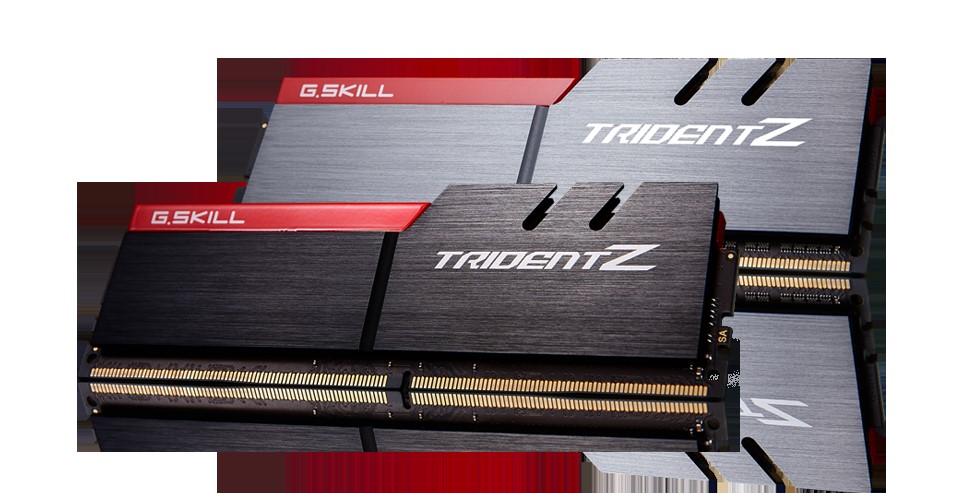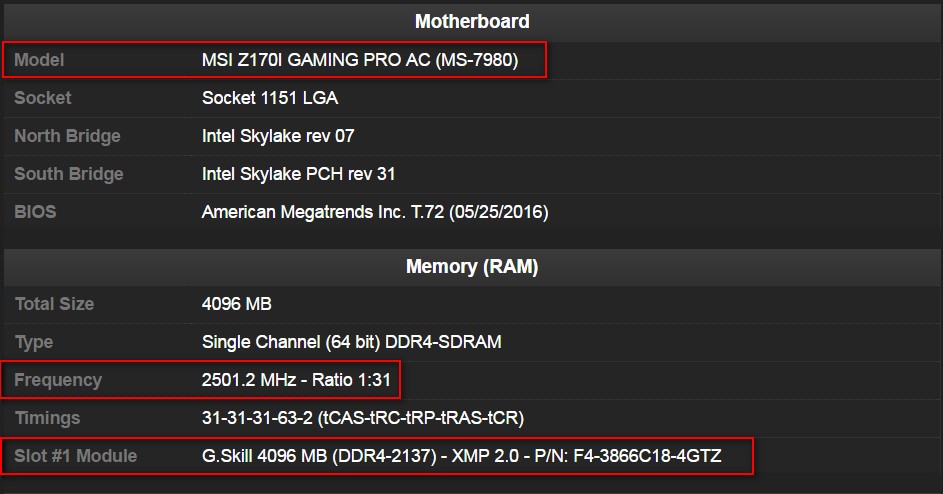DDR4 Overclock Pushed To 5 GHz With 4266 MHz G.Skill Kit
G.Skill announced that an enthusiast overclock has succeeded in pushing the company’s DDR4 memory to 5 GHz.
The overclocker, known as “Toppc,” used a G.Skill Trident Z DDR4 memory kit based on Samsung memory ICs. Currently, the fastest stock DDR4 memory kit operates at just 4,266 MHz, so this is a fairly significant push above what is currently on the market. G.Skill claimed this is the new DDR4 overclocking world record.
What is important to note about this new overclock is that yields of DDR4 memory kits are getting better. Until now, no one has managed to break the 5 GHz DDR4 barrier, even with liquid nitrogen cooling the memory. It’s likely that Toppc was able to do so because of the improved quality of the DDR4 RAM kit.
As the DDR4 technology improves, we’ll naturally see clock speeds continue to scale upwards, and we will likely see faster DDR4 stock memory come out over the course of the year.
Follow Michael Justin Allen Sexton @EmperorSunLao. Follow us on Facebook, Google+, RSS, Twitter and YouTube.
Get Tom's Hardware's best news and in-depth reviews, straight to your inbox.
-
Fates_Demise and he only had to completely screw over his memory timings to gain that little extra...Reply -
bmguyii Is there any tangible gain for this? The memory is not actually any faster so latency shouldn't change. The bandwidth is likely exceeding the internal fabric bandwidth. What's a stream score gain for this? Probably not much so while you can brag, you're really just wasting power and burning up your memory.Reply -
Fates_Demise ReplyIs there any tangible gain for this? The memory is not actually any faster so latency shouldn't change. The bandwidth is likely exceeding the internal fabric bandwidth. What's a stream score gain for this? Probably not much so while you can brag, you're really just wasting power and burning up your memory.
He is actually making the memory faster, but with those timings id be surprised if he had any gain at all overall.
And to answer your main question no there is no point in this. Benchmark tests have already shown that speeds over 2100mhz have very little gain in performance even for programs that utilize the bandwidth heavily. So short of maybe a server system its all for bragging rights. -
alidan ReplyIs there any tangible gain for this? The memory is not actually any faster so latency shouldn't change. The bandwidth is likely exceeding the internal fabric bandwidth. What's a stream score gain for this? Probably not much so while you can brag, you're really just wasting power and burning up your memory.
He is actually making the memory faster, but with those timings id be surprised if he had any gain at all overall.
And to answer your main question no there is no point in this. Benchmark tests have already shown that speeds over 2100mhz have very little gain in performance even for programs that utilize the bandwidth heavily. So short of maybe a server system its all for bragging rights.Is there any tangible gain for this? The memory is not actually any faster so latency shouldn't change. The bandwidth is likely exceeding the internal fabric bandwidth. What's a stream score gain for this? Probably not much so while you can brag, you're really just wasting power and burning up your memory.
some games do gain frames due to memory speed, i can't say how many, for the longest time i always worked on the assumption how fast does not matter so long as you have it.
one place did a comparison from i thin 1800 to 3200 mhz all with the same cpu speed, only memory changed, and the difference was tangible, something around a 60 fps spread on the worst of the games.
not every game, but enough to make memory speed something to consider going forward. -
neblogai I was also sure there is no much difference between fast and slow DDR4- but then I saw what happens if your other components are fast enough. It turns out, fast memory may be important, and can add up to 50% performance extra (Fallout4):Reply
http://www.techspot.com/article/1171-ddr4-4000-mhz-performance/ -
none12345 Ummm....cas31? What a waste of time....Reply
Look it can go super fast....by going super slow.... heh.... -
photonboy Fast DDR4 memory matters when used as GPU memory. When the top-end Zen/Polaris 14nm APU's come out we'll need pretty fast memory to avoid a bottleneck of the GPU.Reply
4000MHz DDR4 at least for the best APU's in 2017. -
Fates_Demise Reply18025820 said:Is there any tangible gain for this? The memory is not actually any faster so latency shouldn't change. The bandwidth is likely exceeding the internal fabric bandwidth. What's a stream score gain for this? Probably not much so while you can brag, you're really just wasting power and burning up your memory.
He is actually making the memory faster, but with those timings id be surprised if he had any gain at all overall.
And to answer your main question no there is no point in this. Benchmark tests have already shown that speeds over 2100mhz have very little gain in performance even for programs that utilize the bandwidth heavily. So short of maybe a server system its all for bragging rights.Is there any tangible gain for this? The memory is not actually any faster so latency shouldn't change. The bandwidth is likely exceeding the internal fabric bandwidth. What's a stream score gain for this? Probably not much so while you can brag, you're really just wasting power and burning up your memory.
some games do gain frames due to memory speed, i can't say how many, for the longest time i always worked on the assumption how fast does not matter so long as you have it.
one place did a comparison from i thin 1800 to 3200 mhz all with the same cpu speed, only memory changed, and the difference was tangible, something around a 60 fps spread on the worst of the games.
not every game, but enough to make memory speed something to consider going forward.
Highly doubtful on that test. Toms did a same test from I want to say 800mhz to like 2800mhz and there was less than a 10% difference from top to bottom. After 1800 less than a 3% difference in fps.
Games do not need much memory speed its capacity that mostly matters for memory in games.

